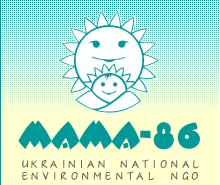They force us to forget about the Chernobyl disaster!
Press-release
For immediate dissemination
September 15, 2005
On the eve of the 20th anniversary of the Chernobyl disaster, the World Health Organisation published results of study "Inheritance of Chernobyl: medical, environmental and socio-economical consequences" — the document questions catastrophic impacts of radiation exposure on the current generation and generations to come. In parallel, the Government of Ukraine develops the strategy of development of the fuel and energy complex up to 2030 — the strategy relies on construction of new nuclear reactors. Moreover, the Government failed to discuss its decision with the peoples of Ukraine that encountered the Chernobyl woes.
Principle of prevention and negative experience of Ukraine allows us not to prove that nuclear energy can be very dangerous. That should be proved by pro atomic lobby that nuclear is safe and useful. It seems that report of World Chernobyl Forum might to be such argument.
Conclusions of the Chernobyl commission are ridiculous, moreover, they are hardly adequate as there are hard facts, the WHO study failed to account for.
- Conflicting statistical data. The international team of WHO expert had to rely on data collected by the Ukrainian party in the previous years and submitted to the WHO experts. However, WHO assessments contradict to the official Ukrainian statistics. For example, official Ukrainian data suggest that by January 1, 2005, in Ukraine only, the number of persons with status of the Chernobyl disaster victims reached 2,646,106 persons, while the WHO estimates suggest 600 thousand persons overall. The Ministry of Labour and Social Policy reports that there are 17,448 families in Ukraine who have ALREADY lost breadwinners due to the Chernobyl disaster. At the same time, WHO gives different figures: 59 deaths (including 9 children) and 3,940 potential future deaths.
- Inadequate radiation exposure data in Ukraine. The experts used radiation exposure data that reflected the real situation fairly roughly. Mr. Volodymyr Usatenko, the expert of the National Radiation Protection Commission of Ukraine, describes radiation exposure monitoring in Ukraine as follows: "In 1986, estimates of radiation exposure of local residents were based on methods that allowed to calculate average external radiation exposure doses for all residents of a given area. In following years, the system of monitoring and laboratory control in Ukraine was gradually destroyed and it was replaced by the analytical system of radiation certification of human settlements. The latter system is even less representative and has even more distant connections with individual human exposure doses. If we add that demographic and epidemiological studies in Ukraine were conducted without any accounting for radiation exposure data, we have to conclude that there are all necessary preconditions for the most wild interpretations of Chernobyl effects".
- Vested interests of one of the parties. The Chernobyl disaster still remains the heaviest nuclear accident in the human history. Consequences of the disaster and associated public outcry deter efforts of the nuclear lobby, that would prefer to promote the nuclear power industry without obstacles, notwithstanding that the industry is inadequately expensive, hazardous and obsolete. It is absolutely natural that the International Atomic Energy Agency (IAEA) uses WHO to hide the real scale of the disaster as the both agencies belong to the UN system.
- Adverse effects of low radiation doses. Among other key conclusions of the Commission, it states that the majority of participants of the disaster mitigation works and residents of contaminated areas got low radiations doses, as a result, their examination did not reveal reproductive dysfunctions or higher incidence of radiation-induced anomalies, so there are no reasons to expect any similar manifestations in the future. At the same time, modern science suggests that there is no safe threshold for radiation impacts on living organisms. This means that any additional radiation exposure, whatever small, will inevitably cause effects among members of the group under the exposure, however one cannot predict who will suffer, how and when.
- Distant risks. For many years and in many different laboratories, researchers studied impacts of low radiation doses on several generations of fruit-flies (e.g. mutations and changes in average lifetime). These experiments proved that 1st and 2nd generation of insects demonstrate higher growth and lifetime parameters, however, following generations of insects become weaker. Depending on external conditions, the precise number of new generations may vary, but the eventual outcome remains the same — descendants of irradiated fruit-flies die. Scientists believe that these experiments prove that low dose radiation exposure causes genome destabilisation.
The most serious effect of radiation exposure is associated with genetic defects, we are not able to see these effects right now, as children who were exposed to radiation before birth or immediately after birth do not have children of their own yet.
Today, Kyiv failed to express any indignation in connection with conclusions of the UN Commission. Tomorrow, we may expect that 11 new reactor units will be constructed here and Ukraine will be transformed into a some sort of radioactive waste dump. The day after tomorrow, our children will not know why they have health problems and die!
We demand the official Kyiv to make public its position on conclusion of the UN Chernobyl Commission!
Ukrainian Nongovernmental Environmental Organizations ("Bachmat"(Artemivsk), "Ecoclub" (Rivne), "Ecology and World" (Cremea), "ÌÀÌÀ-86", "Our Home" (Ivano-Frankivsk), "The Voice of Nature" (Dniprodzerzynsk)).
For further information, please contact to
Oleksandra Zarutska, "ÌÀÌÀ-86"
tel. + 38 (044) 278 7749, 278 3101.
e-mail: [email protected]
